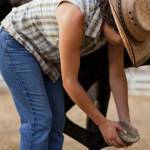Managing Newly Barefoot Horses

Horse owners frequently give their horses some time out of work during the winter months, and part of the letting-down may be allowing the horse to be barefoot during this time.
Horses that have had their shoes removed will usually have tender or sore feet for a few days because their soles are closer to the ground and are therefore more likely to pick up minor bruises. Compare the barefoot horse to a barefoot person walking around outside: every little rock, stick, or irregular patch of dirt produces at least mild discomfort and throws you off balance.
Humans who grow up in barefoot societies develop tough soles that enable them to run around on rough surfaces without damage, and horses’ unshod hooves will also become less sensitive with time. During this period, don’t ask your horse for intense work, especially on hard or rocky ground. Slow rides on grassy surfaces or fluffy arena footing won’t be a problem, but if the horse must work on rough ground, put protective boots on during the ride and take them off afterwards.
Commercial preparations to toughen hoof soles may help some horses avoid the sting of hitting hard ground; ask about these products at the local tack store or racetrack supply outlet. You can also lessen the discomfort of early barefoot days by asking your farrier to refrain from trimming the sole and frog, and leaving the hoof wall a bit longer when the shoes are removed.
High-quality hoof supplements help strengthen hooves so horses can remain barefooted longer. Bio-Bloom PS (Bio-Bloom HF in Australia) contains biotin, methionine, iodine, and chelated zinc at levels shown to improve and support hoof growth, including development of strong hoof wall. Because hoof supplements only affect new hoof growth, it is best to keep horses on the product year-round.








